
Political scientist @Princeton researching policing, quant methods. Former reporter @washingtonpost. https://t.co/2DnFqk0sa8 | https://t.co/m7LepruGMX
How to get URL link on X (Twitter) App


 Theories of “representative bureaucracy” hold agencies function better when staffed by people who share common experiences/values w/ citizens. Most studies examining this idea in policing focus on race. We set out to compare officers to civilians on a host of dimensions. 2/n
Theories of “representative bureaucracy” hold agencies function better when staffed by people who share common experiences/values w/ citizens. Most studies examining this idea in policing focus on race. We set out to compare officers to civilians on a host of dimensions. 2/n

https://twitter.com/jonmummolo/status/1443215691721674764Imagine an encouragement Z for a treatment X that causes an outcome Y (for simplicity, suppose everything is binary). The goal of IV is to address confounding of X & Y by an unobserved U. This confounding means the average treatment effect (ATE) of X on Y is not identified. 2/


 Scholars have developed many causal research designs (SOO, IV, DiD, RD, RCTs, etc.). All rely on bundles of assumptions. But applied settings are messy. What if an assumption fails? Most common choices: give up, or ignore the problem. 2/
Scholars have developed many causal research designs (SOO, IV, DiD, RD, RCTs, etc.). All rely on bundles of assumptions. But applied settings are messy. What if an assumption fails? Most common choices: give up, or ignore the problem. 2/

 The vast majority of cases don’t advance beyond initial Internal Affairs investigation. Even when IA finds policy violation, most misconduct results only in training/counseling, not discipline. Overall, only 0.5% of civilian complaints result in anything beyond a reprimand. 2/n
The vast majority of cases don’t advance beyond initial Internal Affairs investigation. Even when IA finds policy violation, most misconduct results only in training/counseling, not discipline. Overall, only 0.5% of civilian complaints result in anything beyond a reprimand. 2/n 

 The central hurdle in evaluating whether officers from different groups treat civilians differently has been accounting for context. Without the ability to compare officers facing common circumstances, any differences in their behavior become ambiguous. 2/
The central hurdle in evaluating whether officers from different groups treat civilians differently has been accounting for context. Without the ability to compare officers facing common circumstances, any differences in their behavior become ambiguous. 2/
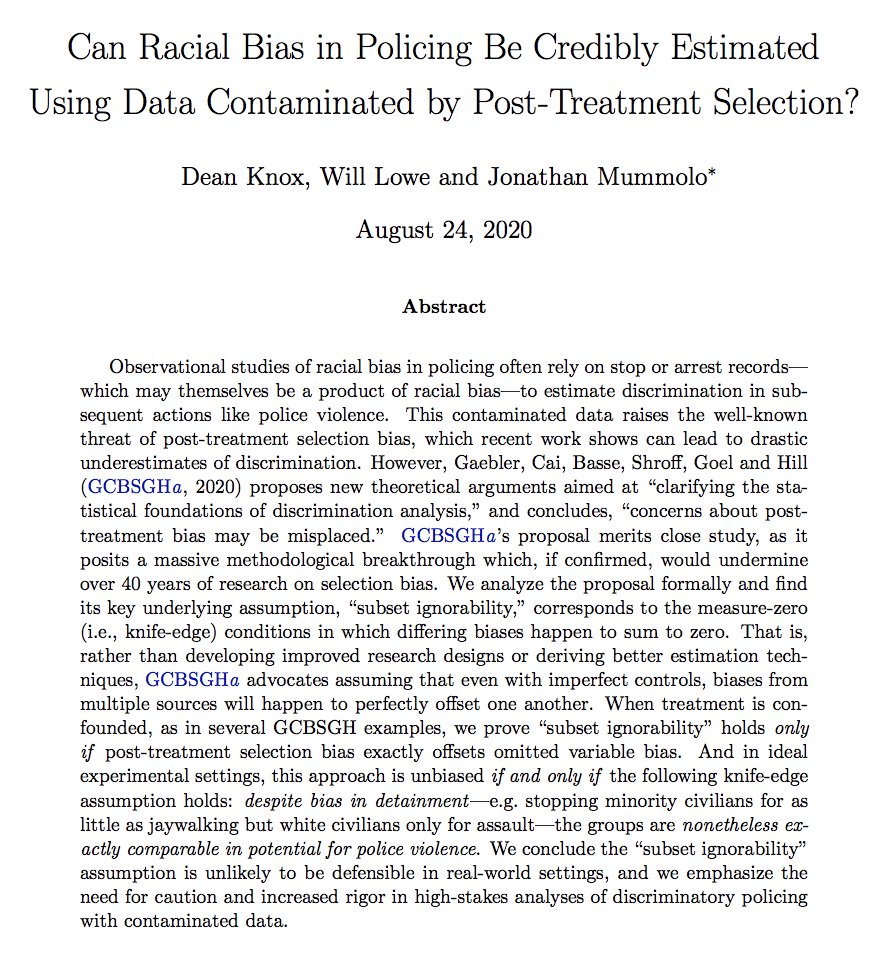
 Studies of racial bias in policing (e.g. Fryer 2019) often rely on detainment data (stops/arrests) to estimate discrimination in subsequent actions, e.g. use of force. If racial bias affects detainment, @sndurlauf & Heckman call this a "classic route to selection bias."
Studies of racial bias in policing (e.g. Fryer 2019) often rely on detainment data (stops/arrests) to estimate discrimination in subsequent actions, e.g. use of force. If racial bias affects detainment, @sndurlauf & Heckman call this a "classic route to selection bias."
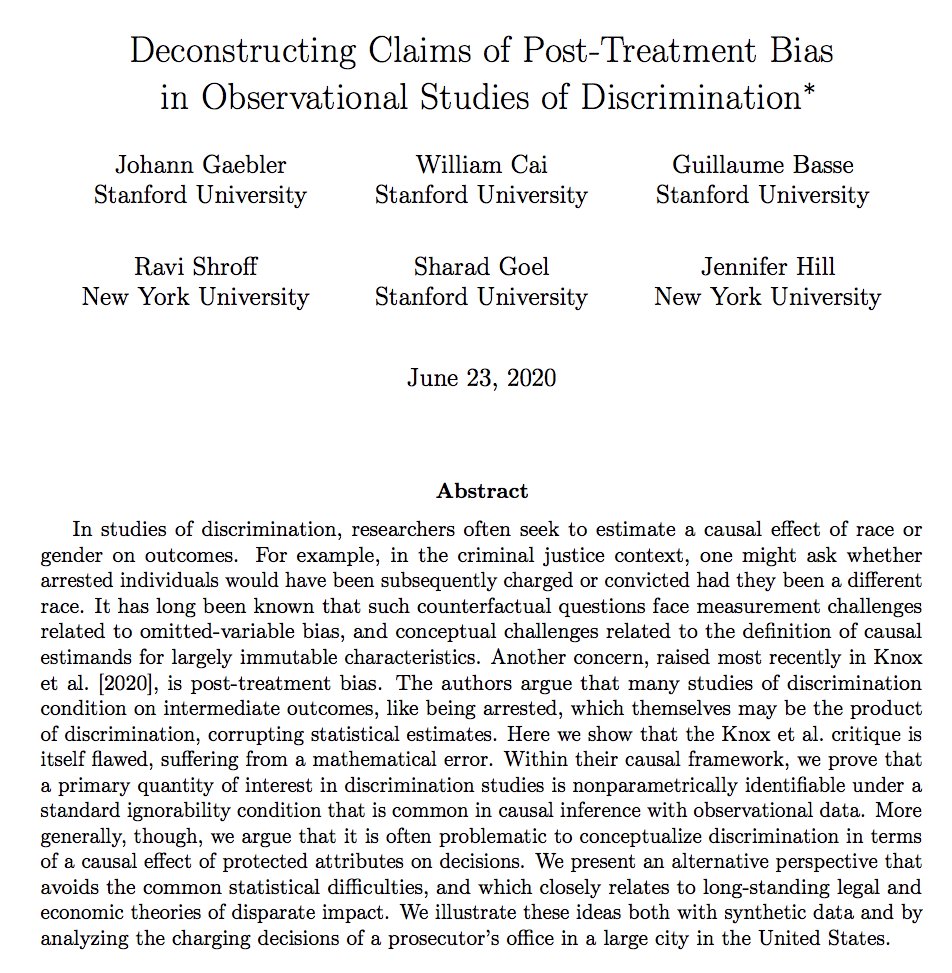
 Our paper asks: given what we know about police-civilian interactions, how can we estimate racial bias using detainment records (stops/arrests) alone? We identify minimal assumptions, and show racial bias can be bounded using only data on stops. @dean_c_knox @conjugateprior
Our paper asks: given what we know about police-civilian interactions, how can we estimate racial bias using detainment records (stops/arrests) alone? We identify minimal assumptions, and show racial bias can be bounded using only data on stops. @dean_c_knox @conjugateprior 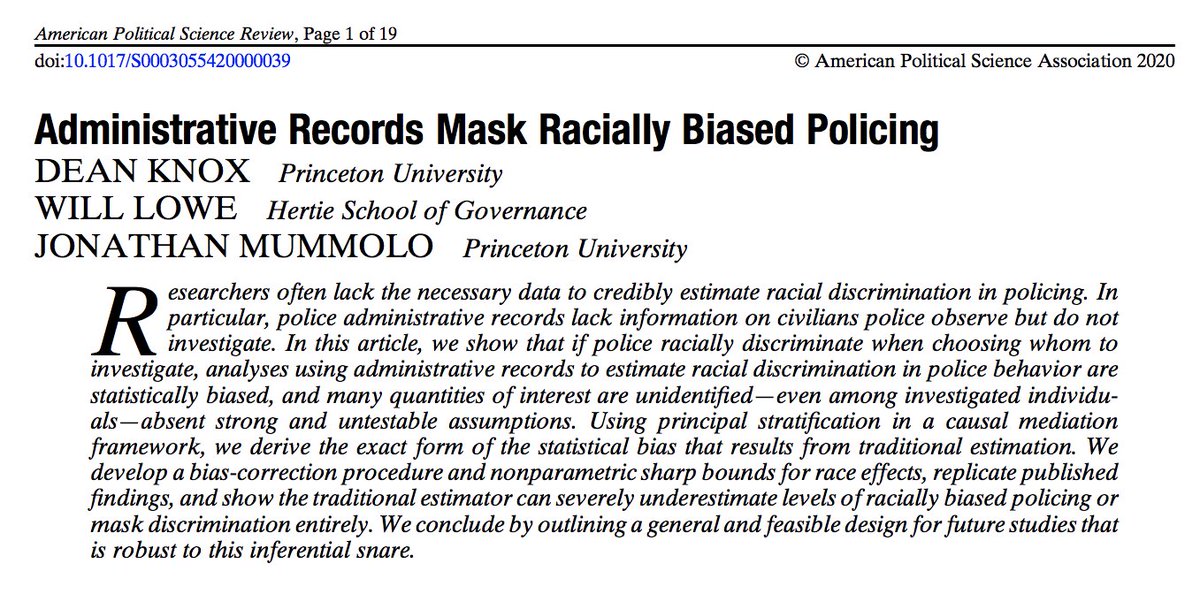
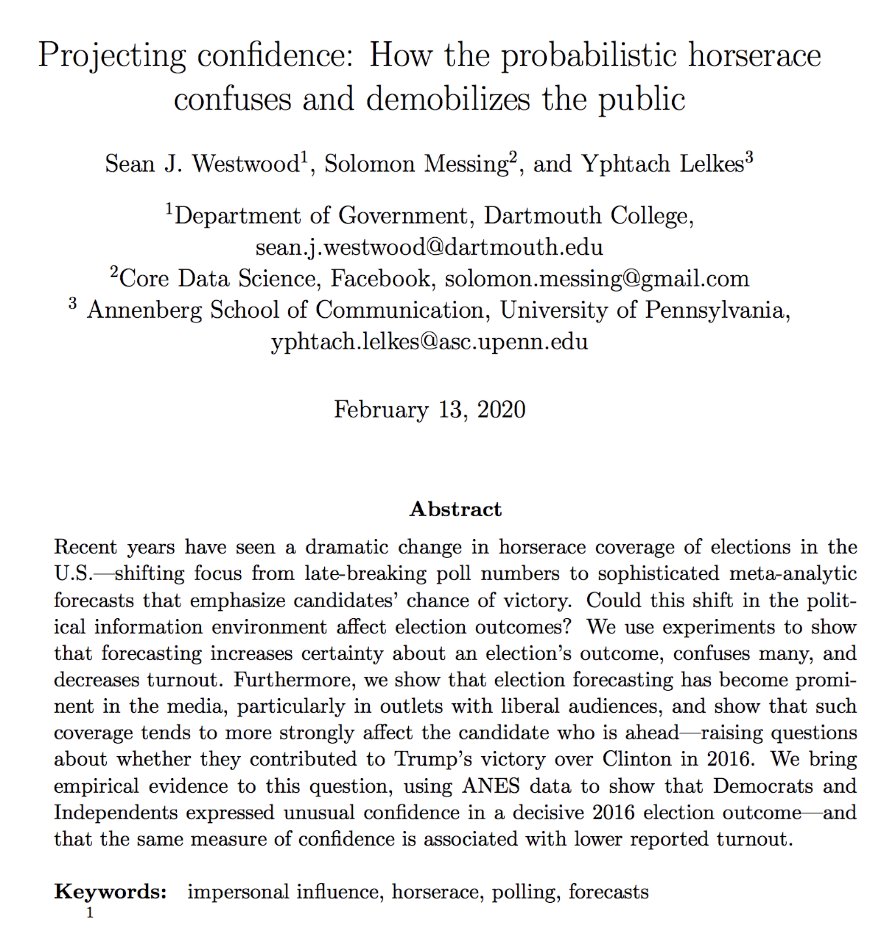
 Unlike polls that show candidates' expected vote share, prob. election forecasts convey the estimated probability that a candidate will win. Problem: folks don’t understand probabilities. This paper demonstrates severity of this confusion, and its political consequences. (2/n)
Unlike polls that show candidates' expected vote share, prob. election forecasts convey the estimated probability that a candidate will win. Problem: folks don’t understand probabilities. This paper demonstrates severity of this confusion, and its political consequences. (2/n) 


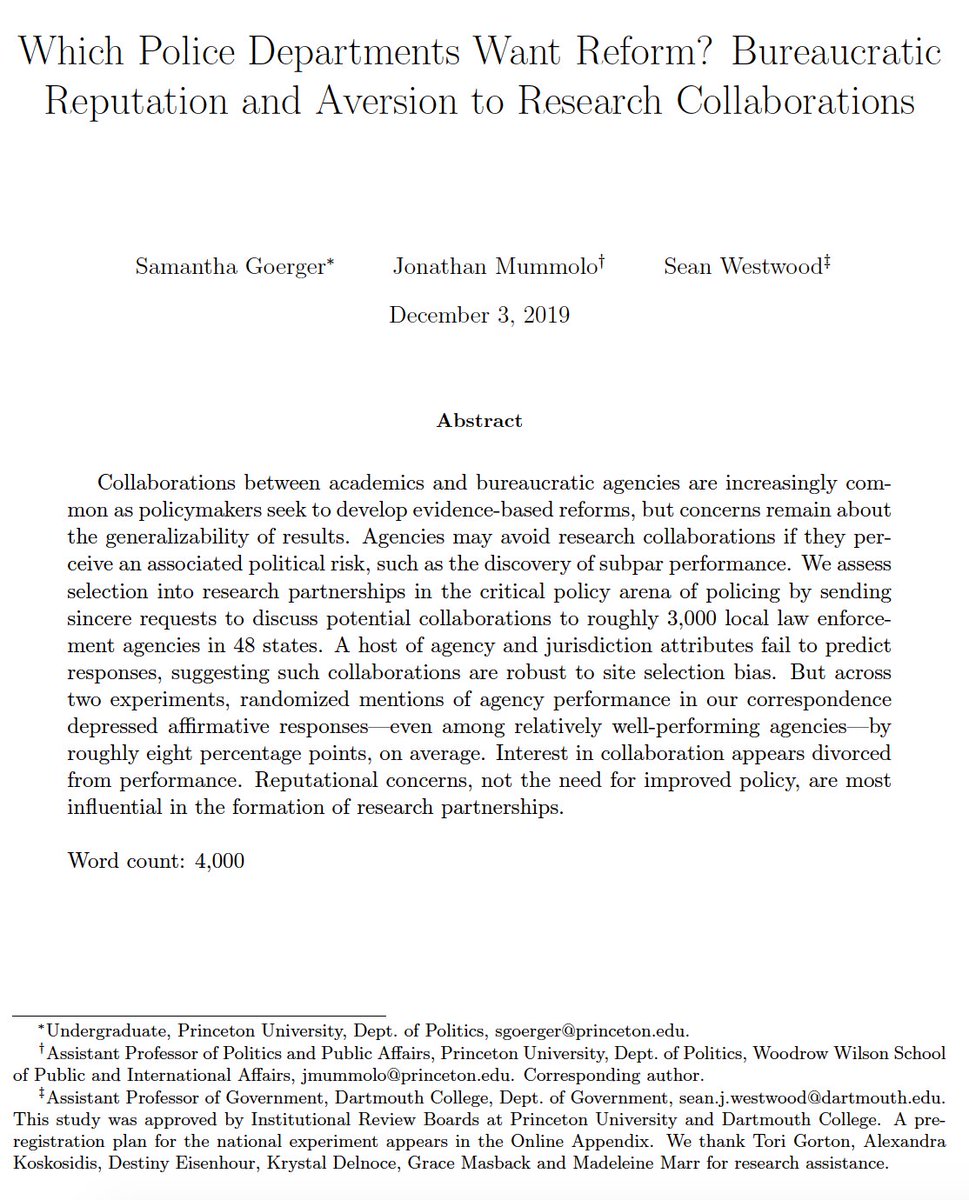
 We sent ~3,000 local police chiefs/sheriffs in 48 states *sincere* invitations to discuss a potential collaboration (no deception). Two goals. 1) Assess the correlates of willingness to collaborate. 2) Assess the role of agency reputation in collaboration decisions. 2/n
We sent ~3,000 local police chiefs/sheriffs in 48 states *sincere* invitations to discuss a potential collaboration (no deception). Two goals. 1) Assess the correlates of willingness to collaborate. 2) Assess the role of agency reputation in collaboration decisions. 2/n 

https://twitter.com/prageru/status/1177209958493913089It is true that Broken Windows expanded in the mid 90s in NYC and crime also fell in that period. But crime also fell in cities across the country that did not embrace Broken Windows. 2/n

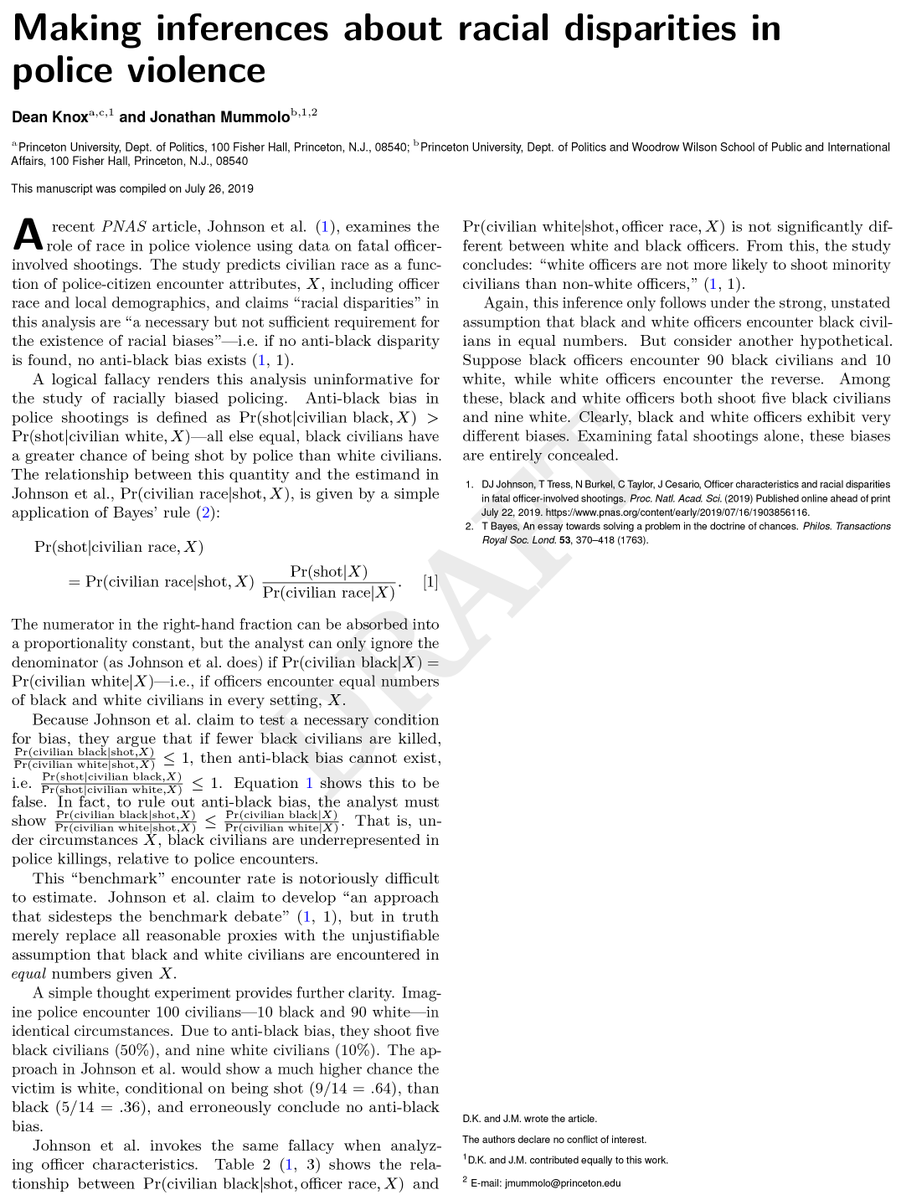
 The study claims its approach “sidesteps the benchmark debate”---the problem of picking a baseline to use to evaluate shooting rates across racial groups. We show this is not true.The study implicitly and wrong assumes black/white civilians encounter police in equal numbers.2/N
The study claims its approach “sidesteps the benchmark debate”---the problem of picking a baseline to use to evaluate shooting rates across racial groups. We show this is not true.The study implicitly and wrong assumes black/white civilians encounter police in equal numbers.2/N
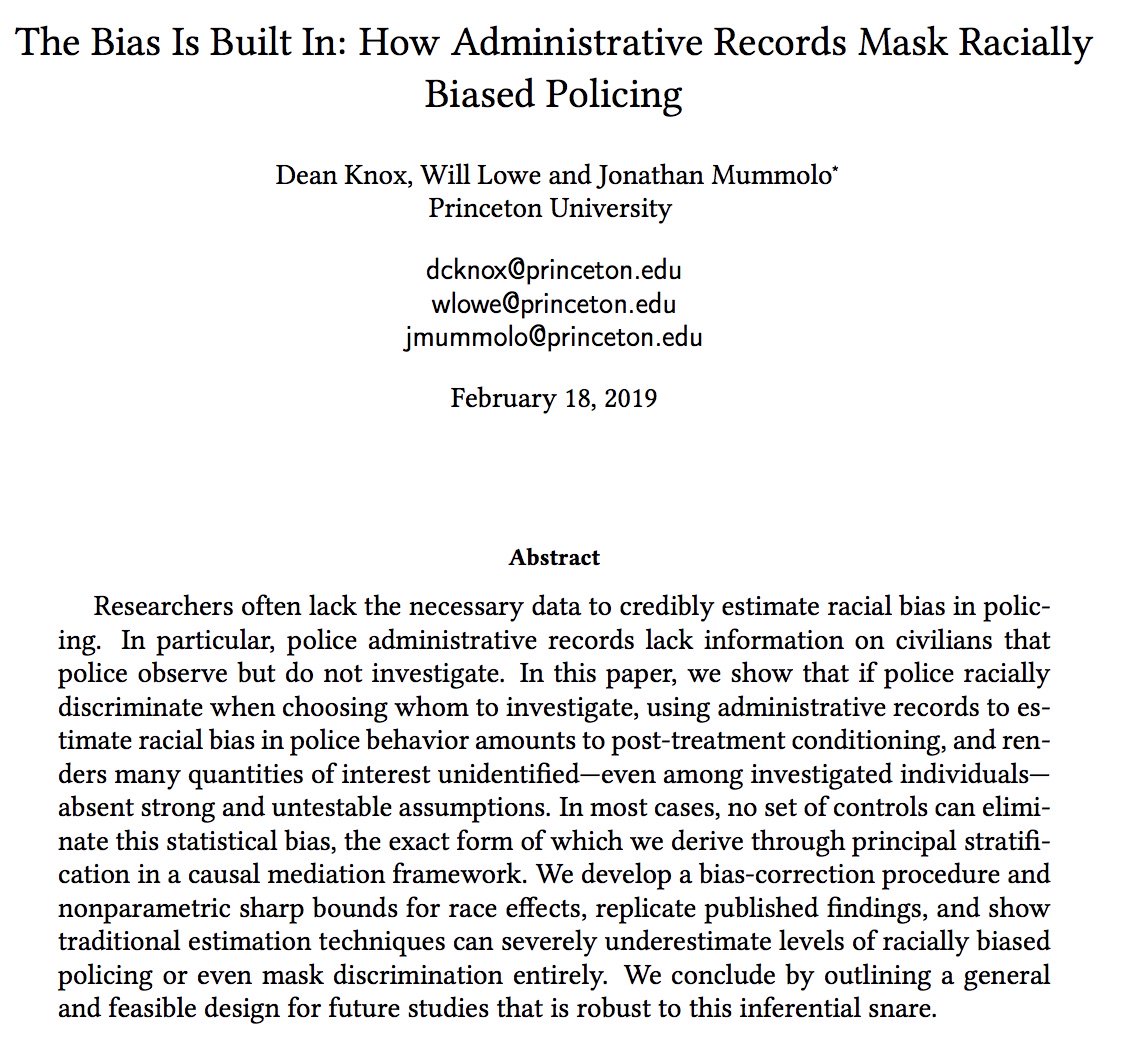
 The study of racial bias in policing is a causal inference problem, but prior work rarely makes causal estimands and attendant assumptions explicit, making analyses difficult to evaluate. We formalize the problem using principal stratification in a causal mediation framework.
The study of racial bias in policing is a causal inference problem, but prior work rarely makes causal estimands and attendant assumptions explicit, making analyses difficult to evaluate. We formalize the problem using principal stratification in a causal mediation framework. 
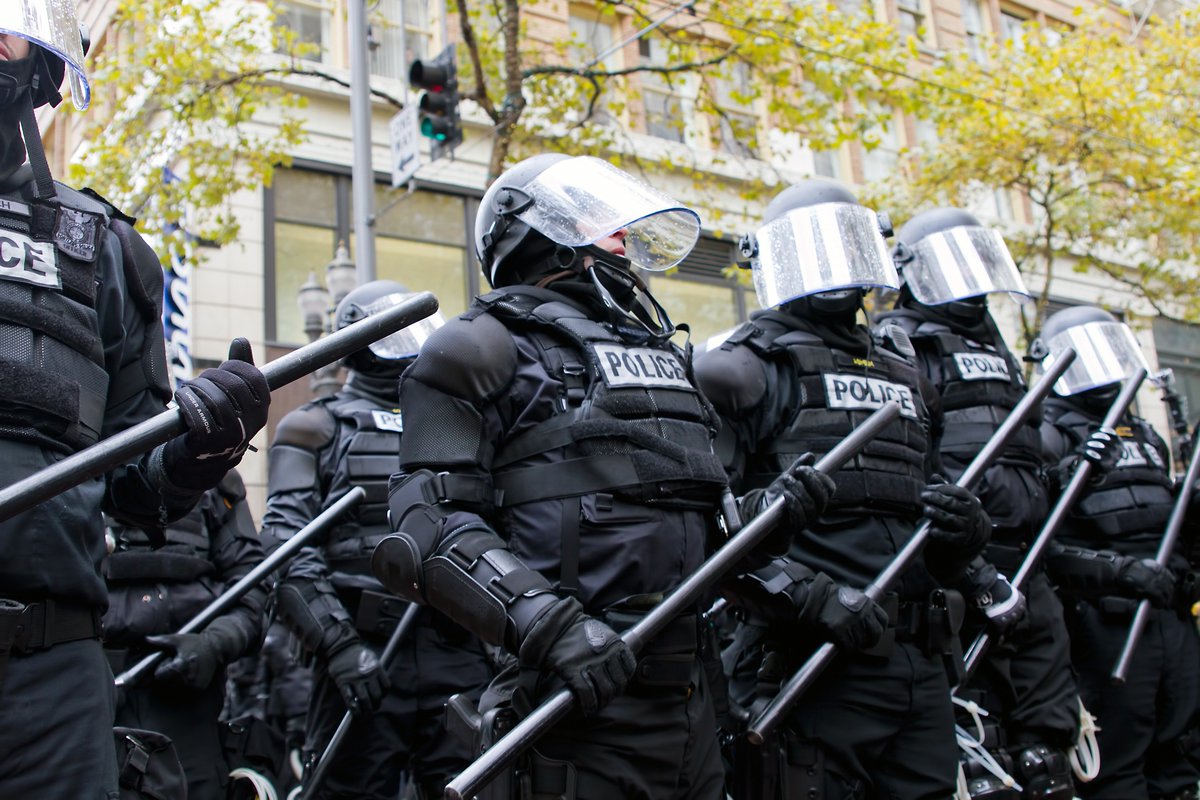
 Four yrs ago this month, coverage of the heavily armed police response to protests in Ferguson, MO fueled a national debate re: police militarization. Police claim militarized units enhance public/officer safety. Critics claim they target racial minorities/erode trust in police.
Four yrs ago this month, coverage of the heavily armed police response to protests in Ferguson, MO fueled a national debate re: police militarization. Police claim militarized units enhance public/officer safety. Critics claim they target racial minorities/erode trust in police.